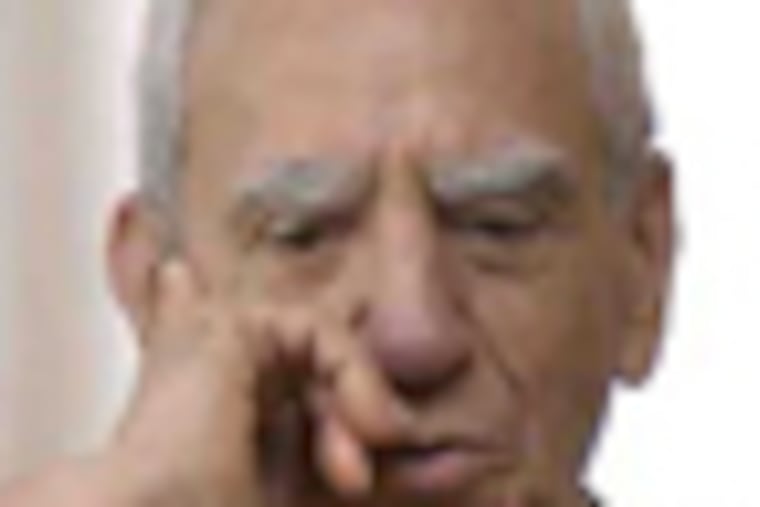Witness: Bevilacqua broke civil and church laws
Cardinal Anthony J. Bevilacqua broke civil and church laws when he ordered aides in 1994 to shred a list identifying dozens of Philadelphia-area priests suspected of molesting children, an expert on canon law and clergy sex abuse testified on Thursday.

Cardinal Anthony J. Bevilacqua broke civil and church laws when he ordered aides in 1994 to shred a list identifying dozens of Philadelphia-area priests suspected of molesting children, an expert on canon law and clergy sex abuse testified on Thursday.
"That was like obstructing justice cubed," the Rev. Thomas P. Doyle told a Common Pleas Court jury. "He's got a list of men who may have abused children - and he's going to shred it?"
The assertion thrust the late cardinal squarely into the spotlight for the first time in the landmark child-sex-abuse and endangerment trial against his former secretary for clergy, Msgr. William J. Lynn.
And though an attorney for Lynn strove to paint Bevilacqua as a bossy micromanager who dictated how the Archdiocese of Philadelphia handled abuse cases, Doyle wouldn't give Lynn a pass.
He said the overriding purpose of the Catholic Church - including its clerics - was to be pastoral, be compassionate, and emulate Christ. "That's what the Church is about, and why priests exist," he said.
As a priest and canon lawyer, Doyle was the author of a groundbreaking 1985 study into sexual abuse by priests. He has since spent decades as a high-profile advocate for abuse victims.
His daylong testimony Thursday marked a change in tempo at the trial. For three weeks, jurors had endured a drumbeat of testimony about local priests who allegedly fondled, raped, or tried to molest children.
Prosecutors turned to Doyle to give them a broader perspective about the longtime practices and processes within the Catholic Church - and how Bevilacqua, Lynn, and others may have applied or ignored them.
They contend that Lynn, as the archdiocesan official who investigated priests' misconduct and recommended their assignments, endangered children by not removing two priests he knew or suspected would abuse children.
A second defendant, the Rev. James J. Brennan, is accused of trying to rape a 14-year-old boy in 1996.
The 1994 list of suspected abusers has emerged as a key piece of evidence for both sides in the case.
Lynn's attorneys say he compiled the list and gave it to his superiors after combing hundreds of priests' secret personnel files in an attempt to gauge the breadth of the abuse problem.
They say he knew nothing about the shredding or a memo found 12 years later in a safe at archdiocesan offices that outlined Bevilacqua's order to destroy the list.
Prosecutors have disputed that version, contending that Lynn knew about the cardinal's directive and kept a version of the list on a diskette found in his office.
Lawyers for the archdiocese turned over the memo and list only this year, weeks after Bevilacqua sat for a private videotaped pretrial deposition. The cardinal died in January at 88.
Doyle said he was a longtime friend and supporter of Bevilacqua. Both men were scholars of canon law, and Bevilacqua also had a doctorate in civil law.
They talked regularly over the years, including when Bevilacqua was in charge of investigating abuse cases in the Diocese of Brooklyn, and later when he was named bishop of Pittsburgh.
Had Bevilacqua asked his advice in 1994 about what to do with the list of priests suspected of sexually abusing children, Doyle said he would have told his friend to take off his ring and cardinal's garments, find the alleged victims, and meet with them.
"And then," he said, "pull all of those priests in there and start an investigation."
Prosecutors contend that Bevilacqua, at Lynn's recommendation, allowed some priests on the list to stay in parishes across the region for another decade. One of them, Edward Avery, has pleaded guilty to sexually assaulting an altar boy in 1997.
Under cross-examination from Alan Tauber, one of Lynn's lawyers, Doyle acknowledged that he once described Bevilacqua as a micromanager and "one of the more authoritarian bishops" in the country.
He also conceded that the cardinal ultimately held the power to decide or decree the fates of priests in his diocese, and that he had vastly more expertise in how to investigate and resolve sex-abuse allegations than his secretary for clergy.
Assistant District Attorney Patrick Blessington tried to blunt that testimony, noting that Lynn was the one who accepted and implemented the cardinal's directives.
"All the orders in the world don't matter unless someone carries them out, right?" he asked Doyle.
"Exactly," the witness replied.
Doyle said he first became interested in clergy sex abuse in 1984, when he and another priest became consultants on cases involving priests in Louisiana. He knew it was the start of a wave of such cases.
"What was happening was that these children [were] now being believed," he said.
When the scandal erupted nationally in 2002, U.S. bishops took the very public step of changing their "essential norms" and declaring they would immediately remove priests accused of abusing children.
Doyle suggested that move was cosmetic.
"The essential norms are a repetition of what already existed in canon law," he told jurors. "They didn't need the essential norms to do the right thing."
The trial resumes Monday.
We invite you to comment on this story by clicking here. Comments will be moderated.